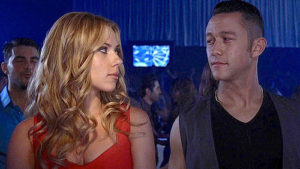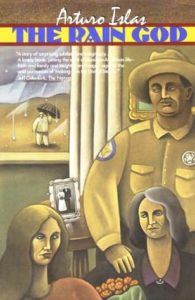
Monthly Archives: October 2016
The Spreading of Masculinity and Patriarchy All Around Latina/o Families and Communities
Masculinity and patriarchy are known to be practiced by men. They use these ideologies to control women and remain ‘superior’ in our hierarchal society. The most dangerous part of these dominant beliefs is how women begin to internalize them towards themselves, their children, and other community members. When Latina/o women have been surrounded by controlling men for most of their lives, they carry the idea that their way of living is part of keeping their cultural values alive. They begin to teach their daughters that in order to be a considered a ‘good woman’ she has to watch over the men in the family and take care of their needs before she is able to acknowledge her own. In the dissertation “A Grounded Theory Approach to Exploring the Impact of Machismo on Second-Generation Latina Women’s Identity Formation,” author Marilyn Valenciano explores the way society and culture contribute to the mental development of Latina women. Valenciano goes on to quote Dr. Abalos: “Machismo is a sacred story that can and does possess us and takes us over even when we rebel against it, the rebellion still dominates our consciousness and thereby prevents us from creating an alternative transforming self that is both feminine and masculine”(9). In other words, Valenciano tries to explain how the lives of Latina women revolve around either surviving the machismo in their culture or trying to combat it. Latina women also tend to be torn from being ‘respectful’ to their culture by obeying and being submissive to men and trying to be independent by breaking the detrimental cycle. The most difficult part of being around machismo is not letting it be internalized and in the novel The Rain God, it can be seen how Nina tries to express her spirituality to her family and both the men and women either ignore her or deem her as crazy. She tries her best to not let it get to her but the reader can sense the solitude she feels from time to time by being treated as an outcast by her family.
No matter how difficult it may be, women within the Latina/o culture need to come together and combat the patriarchy in their people together; as one united force, anything can be accomplished. Tearing each other down and perpetuating this idea of a submissive ‘good woman’ will only cause each other more harm…passing down this behavior only gives power to men and that needs to end. No healthy tradition or culture would allow someone to feel as though their existence is not enough for the world. Listen to your fellow mujeres without judgment. Watch over them. Defend them. Accept them. Hug them. Love them. We are all we’ve got. It may be difficult, but we are strong enough to fight off beliefs that are trying to control us.
http://repository.upenn.edu/cgi/viewcontent.cgi?article=1061&context=edissertations_sp2
Sexuality: Masculinity: Homophobia: Multiculturalism
This week we started to read another short fiction novel, The Rain God by Arturo Islas, which similar to So Far From God, is centered on relationships in “La Familia.” Some of the themes include masculinity and sexuality, something Rodriguez focused on in his work. In some ways, as Dr. Perez noted, the novel could be perceived as a medium used to, critique masculinity, the problem that many LBGTQ activist had with Chicano nationalism. Upon reading Padilla’s article, I chose an article called “Multicultriasm Inclusion of Lesbian and Gay literature in Elementary classrooms, which I believe Islas, would have appreciated if he was still alive. The purpose of the article is to raise awareness about establishing new methods to integrate LBGTQ literature in elementary classrooms. In doing so, authors Logan, et. el believe that schools will provide spaces for the queer community offering a multicultural and diverse learning experience which embraces all people no matter what gender and sexuality they are. In short, the authors similar to Islas want to provide spaces for Queer literature in schools. In the Padilla article, we see how she pays homage to Arturo Islas by revealing the painful discrimination he faced due to the themes he wrote about. Padilla, in her article, talks about how long it took for Islas work to get published. Since some of his work was centered on Queerness, sadly people wanted no part in publishing his literary work. This demonstrates how pervasive homophobia is in our society. It shows how Islas work, because it disrupted the hegemonic ideals associated with gender and sexuality, was not worthy enough of being recognized. With this being said, I like the article that I chose, as it talks about leveling the playing field when it comes to Queer literature-removing the stigma and homophobia, taking on multicultural policies in schools that contribute to leveling the playing field.
Logan, S. R., Watson, D. C., Hood, Y., & Lasswell, T. A. (2016). Multicultural Inclusion of Lesbian and Gay Literature Themes in Elementary Classrooms. Equity & Excellence in Education, 49(3), 380-393.doi:10.1080/10665684.2016.1194239
Male Gender Roles
In the Chicana/o or Mexican culture patriarchy/machismo is represented among most Chicano males in the community. At a young age, men are told and taught that they must be strong and not be sensitive. As are result, most Chicanos develop machismo ideologies since they influence to be the dominant gender. Men are to represent masculinity, and when they don’t there sexuality is brought into question. Chicano families are gender structured that they set specific roles for males to follow. In the novel, “The Rain God” author Arturo Islas tells the story of a Mexican family living in the Mexican borders. Throughout the characters, they demonstrate the structure of a family that live in patriarchal home. For example, the character of Miguel Chico at a young age was taught about gender structures at a young age after his father did not allow him to play with dolls with Maria. His father Miguel Grande teaches Miguel Chico that men are not mean to be weak or emotional. Miguel Grande demonstrates the idea of what a macho male is suppose to be in a family by illustrates the roles how males are supposed to follow in the way they act or how they portray their masculinity to society.
Furthermore, in the article, “Hegemonic Masculinity in Boys Don’t Cry (1999)” writer Renee S. Grozelle discusses how at a young age boys are exposed to negative characteristic associated with masculinity. Teaching young men about how to be masculine can develop violence and aggression within men. Grozelle states, how “negative impacts that hegemonic masculinity has on constructions of gender and sexuality” that challenge male dominance (Grozell). I thought it was interesting to see how Grozelle the masculinity roles of men by giving an example of the film Boys Don’t Cry which describes the notion of masculinity in young males while trying to address issues with the main characters Brandon Teena gender and sexuality problem he encounters for not being “masculine” enough. The film demonstrates how the character has to deal with “dominant masculine ideologies “ for not fitting into the social norms of having to be a straight male. What stood out to me was when Grozell mentions, “ideologies of ‘masculinity’ held by the characters in the film are embedded in the social structure of society.” Males are expected to be masculine because they are set to be strong mentally and physically, if they do not show their masculinity men are often devalued and mistreated like Brandon’s character because they non-masculine individual challenge patriarchal social norms. Therefore, Islas character of Miguel Chico is taught to not be weak because it is not accepted within the Chicano culture. Males in Chicano culture are expected to be masculine and if they not show, they are challenging the dominant discourse.
http://www.inquiriesjournal.com/articles/869/hegemonic-masculinity-in-boys-dont-cry-1999
Masculinity Crisis
http://time.com/4339209/masculinity-crisis/
In the novel The Rain God by Arturo Islas there is a strong sense of masculinity. We are demonstrated how a man has certain things he should do. For example, Miguel Grande is the “macho”, and he portrays that men are guiltless womanizers. “Miguel Grande would scold Maria for allowing his son to play with dolls”(Pg. 15). In this quote we see how a man should not be doing things that are for “women” because if they do they are not seen as masculine anymore.In the article I have chosen to make the connection with the theme masculinity. To be a real man was to be strong, to be a provider, to be in authority, to be the ultimate decision maker, and to be economically, educationally, physically, and politically dominant. However, Jack Myers states that women today are escalating and changing that dynamic. Also to forget about what society has constructed of “men will be men”, and “boys will be boys”. Instead men should have no tolerance for what men have constructed which is sexism and misogyny. Jack Myers argues that patriarchy can be discarded if men become aware, and welcome gender-equality to society. As he states “The future of men is women”. He then lays out ways in which one can become more inclusive of women roles.
Honoring my Grandfather, Jose

Gender Roles

“The Rain God” by Arturo Islas brings up the notion of gender roles through the character of Miguel Chico. Miguel is seen as an outsider because he is not married. We see gender roles when they talk about how he was not allowed to play with dolls because his father wanted him to grow up to be a man. While searching online for topics relating to gender roles, I found the Article “JOSEPH GORDON-LEVITT’S PORN ADDICTION FLICK “DON JON” CHALLENGES GENDER ROLES” by Kerensa Cadenas. This article discusses the film Don Jon and how it showcases gender roles. In the film Don is seen as a macho man who works out all day and picks up on girls all night. After falling in love, his girlfriend starts disapproving of his lifestyle, in one scene she gets angry with him when he tries to buy cleaning products for his home, stating that it was embarrassing for a man to be cleaning his own home. The article and film both gone on to discussing how gender roles prevent us from really connecting with others on an individual level.
https://bitchmedia.org/post/review-don-jon-directed-joseph-gordon-levitt-feminist-porn-addiction
Altar Exhibit For My Uncle, Ricardo
Week 10: “The Rain God”

“The Rain God” by Arturo Islas, is a novel about a Mexican family living in the United States of America. Islas writes about different characters in his novel, and first he starts off with Miguel Chico. Miguel Chico is the son of Miguel Grande and Juanita. Miguel Chico is the only family member to have a higher education and decides to go to College in San Francisco. Miguel Chico distances himself from the family, so the family raises suspicion towards him. Miguel Chico is not married, so his family suspects him of being gay. Miguel Chico’s father, Miguel Grande, did not allow him to play with dolls and wanted Miguel Chico to become a man due to Miguel Grande Macho-ness. Miguel Grande was an individual who was very patriarch. He was viewed as “head of the household” and his presence dominated all the family gatherings. although, Islas does not confirm of the character being gay, we can see that Miguel Chico suffers from sexuality in this novel. Some questions I have are, Why do you think the author, Arturo Islas, leaves us wondering if Miguel Chico was gay or not? Was it because many Chicano/s would not accept his book? Does the Chicano/a Family have an influence in this??
Week 10: Why men Supress Emotions
In Felix beyond the closet, Yolanda argues how Chicano writers have been influenced by the Anglo American Writers. These influences cause stereotypes to rise. Yolanda does not want to challenge he practice of reading, rather she seeks to remain equally attentive to other representational strategies. Yolanda argues that Islas writing expresses masculinity in such a way that can make someone question their identity. As in the case of Felix where he suffers from a number of insecurities that the novel delicately suggests become entangled with this sexual expressions. As seen in his novel The Rain God where the stereotype of Chicano’s. In the novel the theme of masculinity is brought up. Chicano boys were not allowed to play with dolls, because the father (Miguel Grande) did not want his son to be brought up like a girl. This novel establishes the hierarchy of power in the household where the father was in charge and everyone else did what he ordered. The characters in this novel portray a specific character, a character that is supposed to fit the Chicano stereotype.
I have family members, coworkers and friends who believe a boy shouldn’t be playing with dolls, because this would turn him gay. I, in the other hand believe that this is ridiculous.
Where do you believe this idea comes from?
Is it because men are constantly told to suppress their emotions that they find it difficult to openly express their feelings?

